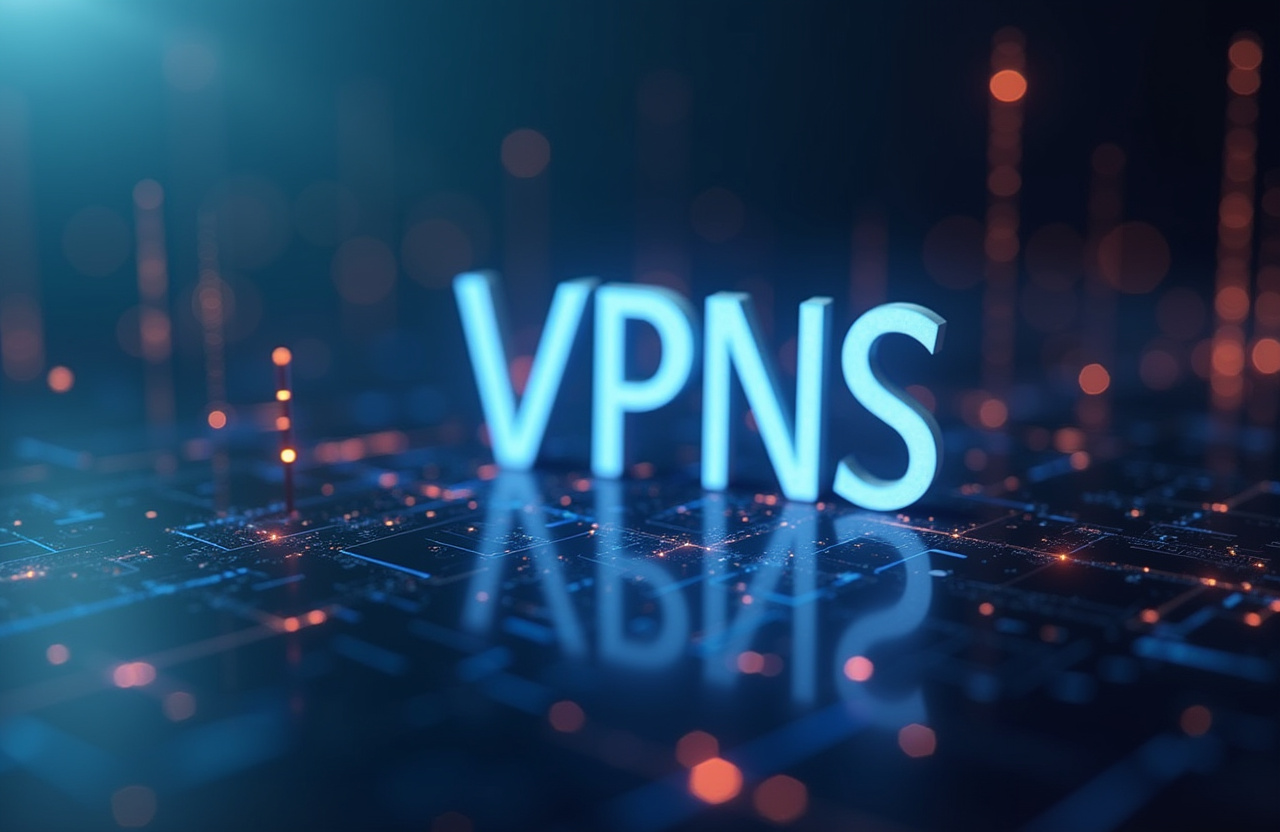VPNs for Cloud Gaming Platforms: Ensuring Player Security

Table of Contents
Cloud gaming has undeniably revolutionized the way we engage with video games, effectively dismantling the traditional barriers of expensive hardware and geographical limitations. Now, players can instantaneously tap into a diverse library of titles on virtually any device – from smartphones and tablets to laptops and smart TVs – provided they have a stable internet connection. This newfound convenience, however, introduces a complex layer of security and privacy considerations that demand careful attention.
Unlike traditional gaming, where processing power and data storage reside locally on a user's machine, cloud gaming relies on remote servers to handle these critical functions. This fundamental shift inherently makes players more vulnerable to a range of cyber threats, including data breaches, account hijacking, and privacy violations stemming from the increased exposure of personal information transiting across public networks. The reliance on internet infrastructure inherently introduces points of vulnerability that malicious actors can exploit.
This is where Virtual Private Networks (VPNs) become indispensable tools for bolstering player security, guaranteeing robust game data protection, and proactively safeguarding privacy within the evolving cloud gaming ecosystem. Therefore, recognizing the integral role of VPNs is more important than ever when embracing cloud gaming platforms. At its core, a VPN operates by establishing a secure, encrypted tunnel between a player's device and a remote server strategically located within the VPN provider's global network.
This tunnel acts as a protective conduit, effectively shielding all data transmitted through it from unauthorized access and surveillance. The encryption process renders data unintelligible to anyone who might intercept it, transforming sensitive information into unreadable code. Crucially, the VPN also masks the player's real IP address, substituting it with the IP address of the VPN server.
This subtle but powerful change not only disguises the player's physical location but also makes it more difficult to track their online activities. In the specific context of cloud gaming, this encrypted tunnel is absolutely vital for protecting sensitive information exchanged between the player's computing device and the cloud gaming platform's servers. This data encompasses a broad spectrum of personally identifiable information (PII), including login credentials (usernames and passwords), financial details used for transactions and subscriptions, in-game progress (which can often represent significant investment of time and money), and real-time chat communications with other players.
Without the robust security offered by a VPN, this sensitive data is susceptible to interception by malicious actors operating on unsecured public Wi-Fi networks or through other exploitable vulnerabilities residing within the complex internet infrastructure. Furthermore, a VPN offers robust defense measures to prevent Distributed Denial-of-Service (DDoS) attacks, a common tactic used by unscrupulous players or competitive rivals to deliberately disrupt the gaming experience. By effectively masking the player's true IP address, VPNs significantly hinder the ability of attackers to target their specific connection with a flood of overwhelming malicious traffic.
This proactive protection ensures a more stable and reliable connection, preventing interruptions and frustrating lag spikes. Beyond the realm of security, a VPN can also enhance the overall gaming experience in certain situations. By intentionally connecting to a VPN server geographically situated closer to the physical location of the cloud gaming server, players may be able to noticeably reduce latency (the delay between input and action) and ping times (the round-trip time for data packets).
This optimization translates directly into smoother, more responsive gameplay, particularly crucial in fast-paced action games or competitive online environments where every millisecond matters. Adding to the multifaceted benefits, a VPN can also circumvent geographical restrictions imposed by certain cloud gaming platforms. These restrictions often limit access to specific games or content based solely on the player's location.
By connecting to a VPN server in a region where the desired game is accessible, players can effectively bypass these limitations, expanding their entertainment options and allowing them to connect with friends and gaming communities across international borders. All in all, adopting a VPN within the landscape of cloud gaming is not merely a matter of convenience or a desirable add-on; it has evolved into an indispensable safeguard for responsible and secure gameplay. A VPN empowers players to take proactive ownership of their valuable data, to diligently protect their personal privacy in an increasingly interconnected world, and to wholeheartedly embrace the undeniable benefits of cloud gaming without having to compromise their fundamental security and peace of mind.
The expansion of cloud gaming has brought forth unique and significant vulnerabilities concerning the protection of game data, requiring players and platforms alike to adopt proactive security measures. In stark contrast to traditional gaming setups, where game files and progress are typically stored locally on a player's personal device, cloud gaming fundamentally relies on remote servers to host, process, and manage all game-related data. This architectural difference inherently means that sensitive information, encompassing everything from detailed game progress and meticulously crafted character profiles to in-game purchases involving real currency and associated payment information, is constantly being transmitted over the internet.
This continuous data transmission makes it potentially vulnerable to interception, manipulation, and outright theft, which can have devastating consequences for players. A robust and reliable VPN serves as a crucial and multifaceted shield in this vulnerable ecosystem, comprehensively encrypting virtually all data transmitted between the player's accessing device and the cloud gaming server infrastructure. This encryption process is not merely a superficial measure; it actively scrambles the data into an entirely unreadable format, often employing complex algorithms and long encryption keys.
This scrambling process makes it exponentially more difficult, if not practically impossible, for unauthorized parties to decipher or understand the data, even if they successfully manage to intercept it during transmission. The strength, type, and implementation of encryption become deciding factors when choosing a VPN client to use. The level of encryption employed by reputable VPN providers is typically military-grade, adhering to industry best practices such as Advanced Encryption Standard (AES) with key lengths of 256 bits or higher.
This level of security is widely recognized and respected as providing a robust barrier against even sophisticated attempts at decryption, rendering intercepted data effectively useless to malicious actors. Crucially, beyond simply encrypting the data stream, a VPN also plays an essential role in masking the player's public-facing Internet Protocol (IP) address which typically serves as a unique identifier for their connection. This IP address can be exploited to pinpoint their approximate geographical location, track their overall online activities, and even potentially identify their Internet Service Provider (ISP).
By diligently concealing the player's actual IP address and substituting it with the IP address of the VPN server within its network, a VPN effectively thwarts these tracking attempts, preventing advertisers, government regulatory agencies, and a wide range of other third parties from monitoring their gaming behaviors and discreetly collecting sensitive personal information. This IP masking feature is particularly critical for gamers who place a high premium on their privacy and prefer to avoid being subjected to unwanted targeted advertisements based on their gaming preferences, or unwarranted surveillance of their online activities. VPNs, therefore, allow people to embrace gaming while being anonymous.
In addition to these core security benefits, a VPN can provide crucial protection against insidious Man-in-the-Middle (MitM) attacks, a particularly concerning type of cyberattack where hackers strategically position themselves to intercept and potentially manipulate communication flowing between two or more unsuspecting parties, such as a player and their chosen cloud gaming server. By consistently encrypting the entire data stream traveling through its secure tunnel, the VPN makes it inherently impossible for attackers to effectively eavesdrop on the otherwise open communication or to surreptitiously tamper with the data being actively transmitted in either direction. This robust protection is paramount for preventing the potentially devastating theft of login credentials, such as usernames and corresponding passwords, financial details used for in-game purchases, or other highly sensitive information that could be exploited for malicious purposes.
The demonstrable benefits of employing a VPN for comprehensive game data protection extend far beyond individual players and their specific concerns. Cloud gaming platforms themselves can derive significant advantages from proactively recommending, actively encouraging, or even mandating the routine usage of robust VPN solutions by their user base. This proactive approach significantly enhances the overall intrinsic security of their offered services, substantially reduces the risk of damaging data breaches, and serves to protect their valuable user base from a wide spectrum of potential cyber threats.
By making data protection a high priority through the strategic implementation of VPNs, cloud gaming platforms can unequivocally demonstrate their steadfast commitment to safeguarding player security and cultivating a more secure, trusted, and ultimately more enjoyable and immersive gaming environment for all participants.
The cloud gaming era introduces some privacy challenges for players, where data collection and targeted advertising increasingly blur the lines between personalized experiences and intrusive surveillance. In this environment, it is important for gamers to be aware of the potential risks to their personal information and learn how to take control of their digital footprint. Cloud gaming platforms often acquire vast amounts of data about their users, from their gaming habits to their preferences and demographic information.
Although this data can be used to improve the gaming experience, it can also be shared with other advertisers or used for unclear purposes without the user's consent. This raises valid concerns about the privacy and security of player data, particularly in the context of targeted advertising. A VPN is useful for users who want to protect their privacy by masking their IP address and encrypting their internet traffic.
This makes it more difficult for cloud gaming platforms and third parties to track their activity and collect personal information. Furthermore, by using a VPN, players can prevent data collectors from recognizing them and building detailed profiles around the gaming interests. In addition to hiding the IP address, the VPN also encrypts the data transmitted between the player's device and the cloud gaming server.
This prevents espionage by other parties such as advertising and government agencies that may be trying to intercept sensitive information. The encryption ensures that even if the data is intercepted, it will hardly be readable by unauthorized users. However, even with a VPN, it is important for players to take action to improve their privacy and security in the cloud gaming environment.
This includes reviewing and adjusting privacy settings on cloud gaming platforms. By clearly defining what data is compiled and how to use it, users can limit the amount of personal information that platforms collect and share. When players use a cloud, service they must ensure they have secure passwords and enable two-factor authentication to prevent unauthorized access to their accounts.
This can ensure that when the account or other credentials is breached, there is another wall of security stopping access to the account. VPNs contribute to protection especially when using public Wi-Fi networks, which are generally unprotected and vulnerable to spying. By connecting to a VPN server, players can create a secure encrypted tunnel for their data, preventing hackers from stealing personal information.
Players can also use anti-tracking tools and browser extensions to limit the amount of data that websites and advertisers can collect about them. These tools can block tracking cookies, mask browser fingerprints, and prevent websites from learning about their browsing habits. It is also important for players to be aware of the privacy policies for cloud gaming platforms and other services they use.
These policies outline how the platform collects, uses and discloses personal information. By clearly defining what data this information is used users can be aware of it. Players should thoroughly review these policies and exercise caution when sharing personal information.
It is important to note that although a VPN can protect privacy on cloud services, it is not a perfect solution. Some cloud gaming platforms may still be able to collect data about players through other means such as browser cookies. Therefore, it is important for players to protect their privacy and avoid sharing personal information when using cloud-based services.
By adopting a strong VPN, players can reclaim control of their online privacy, mitigate the risks associated with data collection, and enjoy a safer and more secure gaming experience.
Selecting the Right VPN for Cloud Gaming: A Comprehensive Guide Choosing the best VPN for cloud gaming involves carefully considering several critical factors to ensure optimal performance, security, and privacy. Not all VPNs are created equal, and some may be better suited for gaming than others. A poorly chosen VPN can actually worsen the gaming experience by adding latency, reducing speed, or compromising security.
Therefore, understanding these key aspects is essential for picking a VPN that enhances rather than detracts from cloud gaming. Speed and latency are paramount for cloud gaming, as any significant delays can make games unplayable. A good VPN should offer fast connection speeds and low latency to minimize lag and ensure smooth, responsive gameplay.
Look for VPNs with a large server network, as this increases the likelihood of finding a server close to the cloud gaming server, which can significantly reduce latency. The protocols can vary greatly between clients and affect functionality, so it's advisable to test VPN speed through diagnostic websites before deciding. Server locations are a crucial factor.
A VPN with servers located in regions close to the cloud gaming servers will typically provide better performance. This minimizes the distance data needs to travel, reducing latency and improving response times. If you frequently play on servers in specific regions, ensure the VPN has servers in those locations.
Security features are of utmost importance. Choose a VPN that offers strong encryption (preferably AES-256), a kill switch (which automatically disconnects the internet connection if the VPN drops), and protection against DNS leaks (which can expose your IP address even when using a VPN). A strict no-logs policy is also essential, ensuring that the VPN provider does not track or store your online activity.
This is paramount for protecting your privacy and preventing your data from being shared with third parties. Compatibility with your devices is also important. Ensure the VPN is compatible with all the devices you use for cloud gaming, including computers, smartphones, tablets, and smart TVs.
Most reputable VPNs offer apps for various platforms, making it easy to connect and disconnect the VPN on different devices. Ease of Use can be easy be overlooked, but should be considered. A VPN with a user-friendly interface will make it easier to connect to servers, adjust settings, and troubleshoot any issues.
Look for a VPN with a simple and intuitive interface, especially if you are not technically savvy. Customer Support is a crucial factor in the selection process of a VPN provider. A VPN with responsive and helpful customer support can be invaluable if you encounter any issues.
Look for a VPN that offers 24/7 support via live chat or email. While some free VPNs are available, they often come with limitations, such as slower speeds, limited server locations, data caps, and intrusive advertising. They may also lack essential security features and have questionable privacy policies.
For cloud gaming, it's generally advisable to choose a paid VPN that offers better performance, security, and privacy. Also remember to read user reviews and expert opinions. Researching the experiences of other users and reading expert reviews can provide valuable insights into the performance, reliability, and security of different VPNs.
Also, consider the subscription cost and payment options. VPNs offer various subscription plans, ranging from monthly to yearly. Compare the costs of different plans and choose one that fits your budget.
Also, ensure the VPN provider offers secure payment options and a money-back guarantee, allowing you to try the service risk-free. Always check the ToS, Terms of Service, of any VPN clients before choosing and paying for them.
Optimizing Your VPN for Cloud Gaming: Best Practices and Troubleshooting
Once you have selected a suitable VPN for cloud gaming, it's crucial to optimize its settings and usage to achieve the best possible performance and security. Proper configuration can further minimize latency, enhance stability, and maximize data protection. This section outlines best practices and troubleshooting tips for optimizing your VPN for cloud gaming.
Choosing the optimal server is vital. Experiment with different server locations to find the one that provides the lowest latency and fastest speeds for your cloud gaming platform. Typically, servers located closer to the cloud gaming server will offer better performance.
Use VPN speed test tools to evaluate different server locations and determine the best option. Selecting the right VPN protocol can drastically improve client performance. Different VPN protocols offer varying levels of speed, security, and stability.
WireGuard and OpenVPN are two popular protocols known for their good balance of speed and security. Experiment with different protocols to see which one works best for your setup. Some older protocols, like PPTP, may be faster but offer weaker security and are generally not recommended.
Configure split-tunneling to boost the performance of your VPN when gaming. This allows you to route only game-related traffic through the VPN while allowing other traffic (such as web browsing) to bypass it. This can reduce latency and improve overall speed, as only the data that requires protection is being encrypted and routed through the VPN server.
Make sure you regularly update the VPN software. Keep your VPN software up to date to ensure you have the latest security patches, bug fixes, and performance improvements. Most VPN apps will automatically notify you of updates, but it's a good idea to check for updates manually periodically.
Close unnecessary applications, as having many other running programs can consume bandwidth and system resources, which can affect your gaming performance. Close any unnecessary applications before launching your cloud gaming platform. Troubleshooting Common VPN Issues is critical.
If you experience problems with your VPN, such as slow speeds, connection drops, or inability to connect, try the following troubleshooting steps. First, try connecting to a different server location. This can help determine if the issue is specific to a particular server.
Secondly, try switching to a different VPN protocol. As previously mentioned, different protocols offer varying levels of performance and stability. Thirdly, restart your VPN software and device and then check your internet connection to ensure that it is stable and working correctly.
A weak or intermittent internet connection can cause problems with your VPN. Fourthly, disable any firewalls or antivirus software that may be interfering with the VPN connection. Temporarily disabling these programs can help determine if they are the source of the issue.
Keep in mind that this can leave your system exposed, so perform this step with caution. Fifthly, contact your VPN provider's customer support for assistance. They may be able to provide specific troubleshooting steps or identify any server-side issues.
Monitor your VPN performance regularly by using speed test tools to track your connection speeds and latency. If you notice a significant drop in performance, try adjusting your VPN settings or contacting your provider for support. Consider upgrading your internet.
If you consistently experience slow speeds or high latency, even with a VPN, you may need to upgrade your internet plan to a faster connection. Using a VPN for cloud gaming offers significant benefits in terms of security and privacy, but it's important to optimize its settings and usage to achieve the best possible gaming experience. By following the best practices and troubleshooting tips outlined in this guide, you can ensure that your VPN enhances rather than detracts from your cloud gaming sessions.
Regularly testing the VPN and adjusting settings is the key to long-term success.
Stay Updated
Get the latest VPN news, tips, and exclusive deals to your inbox.




